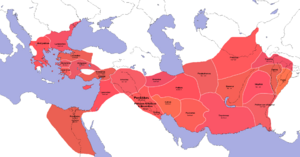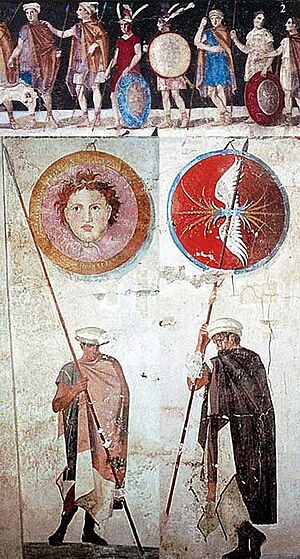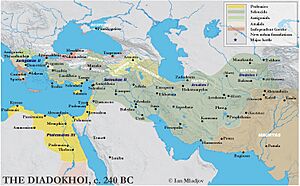Diadochi facts for kids
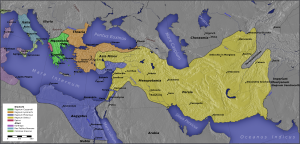
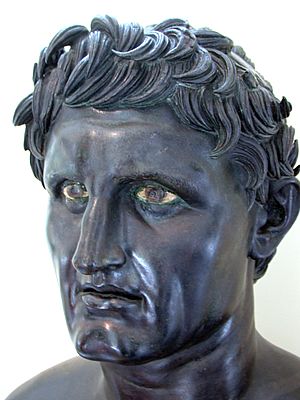
The Diadochi (say "dy-AD-uh-ky") were powerful generals, friends, and even family members of Alexander the Great. After Alexander died in 323 BC, they fought for control of his huge empire. These fights, called the Wars of the Diadochi, marked the start of the Hellenistic period. This was a time when ancient Greek culture spread far and wide, from the Mediterranean Sea all the way to India.
Some of the most famous Diadochi were Ptolemy, Antigonus, Cassander, and Seleucus. They were the last ones standing after many years of war. They ended up ruling in Egypt, Asia Minor, Macedon, and Persia. Each of them started a powerful family line that lasted for hundreds of years.
Contents
What Does Diadochi Mean?
The word Diadochi comes from an ancient Greek word, Diádochoi, which means "Successors." It refers to someone who is expected to take over a position or office. In Alexander's time, his generals expected to receive important commands. When he died, they had to figure out how to get those positions for themselves.
Alexander the Great's Rise to Power
Alexander's father, King Philip II, was a brilliant leader. He made Macedon a strong military state. Philip trained Alexander carefully, even having famous philosophers teach him. Alexander showed his skill early on by taming a wild horse named Bucephalus. Philip was so proud, he said Macedon wasn't big enough for Alexander's ambitions!
Philip planned to attack the powerful Persian Empire. He even made Alexander a "regent" (a temporary ruler) when he was away fighting. Alexander always wanted to be part of his father's victories. He was said to be sad that his father would leave him nothing important to do.
In 336 BC, Philip was killed. The 20-year-old Alexander quickly became king. He then led his army to conquer the Persian Empire, becoming known as Alexander the Great. His army was made up of many different groups of people. Alexander seemed to win every battle he fought.
Alexander's Vast Empire
When Alexander the Great died on June 10, 323 BC, he left behind a massive empire. It stretched from his homeland of Macedon and the Greek city-states to parts of India in the east. His empire included areas in the Balkans, Anatolia, the Levant, Egypt, and most of the former Persian Empire.
Who Were the Successors?
Alexander had a special group of officers called the hetairoi, or "companion cavalry." These were high-ranking generals, often related to Alexander, who could be assigned to different tasks as needed. They always expected to receive important commands. When Alexander died, this system ended. The hetairoi became the Diadochi, suddenly unsure of their future roles.
The Diadochi are often grouped by their rank and social standing when Alexander died. These were their starting points as they began to fight for power.
Important Generals
- Craterus was a key commander in Alexander's army. Alexander had ordered him to lead veterans back to Macedon and become regent there. But Alexander died before this could happen. Craterus rushed to Macedon to protect Alexander's family. He helped Antipater defeat a Greek rebellion in 322 BC.
- Antipater was an advisor to Alexander's father, King Philip. Alexander left Antipater in charge of Macedon and Greece when he went to conquer Persia. After Alexander's death, Antipater was confirmed as the General of Greece. He was one of the few people who could keep the empire from falling apart.
- Somatophylakes were Alexander's seven personal bodyguards. Many of them became important Diadochi, including Ptolemy and Lysimachus.
- Satraps were governors of provinces in the empire. Many satraps, like Antigonus and Seleucus, also became powerful Diadochi.
The Royal Family
Alexander's family members also played a role in the struggles. These included his half-brother Philip III Arrhidaeus, his young son Alexander IV, and his mother Olympias.
The Epigoni
The Epigoni (say "ih-PIG-uh-ny") means "offspring." This term was used later to describe the second generation of Diadochi rulers. These were the sons and heirs of the original generals who continued to rule the kingdoms their fathers had created.
The Fight for the Empire
Dividing the Empire (323–319 BC)
After Alexander's death, his generals immediately began to argue about who should rule. There were two main choices: Alexander's half-brother, Arrhidaeus, or Alexander's unborn child with his wife, Roxana.
A deal was made: Arrhidaeus would be crowned King Philip III. If Roxana's child was a son, they would rule together. Perdiccas, a powerful general, was named Regent (a temporary ruler). When Roxana gave birth to a son, Alexander IV, he became co-king.
Perdiccas then called a meeting to divide the empire into provinces, each with its own governor (satrap).
- Ptolemy received Egypt.
- Antigonus received Phrygia, Lycia, and Pamphylia.
- Lysimachus received Thrace.
- Seleucus was given Babylonia.
- Antipater and Craterus were to rule Macedon and Greece together.
War in Greece
News of Alexander's death caused a rebellion in Greece, known as the Lamian War. Athens and other cities fought against Macedonian rule. Antipater and Craterus eventually defeated the rebellion in 322 BC. This stopped resistance to Macedon for a while.
First War of the Diadochi (322–320 BC)
Soon, the Diadochi started fighting each other. Perdiccas planned to marry Alexander's sister, which made other generals like Antipater, Craterus, Antigonus, and Ptolemy angry. The war officially began when Ptolemy stole Alexander's body and took it to Egypt.
Perdiccas was later killed by his own generals during an invasion of Egypt. After his death, the remaining generals made a new agreement called the Partition of Triparadisus. Antipater became the new Regent of the Empire. The two kings, Philip III and Alexander IV, were moved to Macedon.
Antigonus kept his lands and was given the job of defeating Perdiccas's former supporter, Eumenes. This meant Antipater controlled Europe, and Antigonus controlled much of Asia.
Antipater's Death
In 319 BC, Antipater died. He was one of the few people strong enough to keep the empire united. After his death, the wars started again, and the empire truly began to break into separate kingdoms. Antipater chose Polyperchon as his successor, not his own son, Cassander.
This led to a civil war in Macedon between Polyperchon and Cassander. Cassander was supported by Antigonus and Ptolemy. Polyperchon fled with the young King Alexander IV and his mother Roxana. Cassander eventually won, capturing and killing Alexander IV and Roxana in 310 BC. This ended Alexander the Great's direct family line.
The Wars of the Diadochi (319–275 BC)
The Wars of the Diadochi were a long series of conflicts fought over Alexander's empire.
The Battle of Ipsus (301 BC)
The Battle of Ipsus was a major turning point. It finally broke up Alexander's unified empire. In this battle, Antigonus I and his son Demetrius fought against a group of other Diadochi: Cassander, Lysimachus, and Seleucus I. Antigonus was killed.
After this battle, the empire was clearly divided into several large kingdoms. The Ptolemies ruled Egypt, the Seleucids ruled a vast area in Asia, and the Antigonids ruled Macedon.
The Hellenistic Kingdoms
The kingdoms created by the Diadochi lasted for a long time, spreading Greek culture and influence across the ancient world. This period is known as the Hellenistic period.
Ptolemaic Egypt
Ptolemaic Egypt was ruled by the Ptolemy family. The first three rulers, Ptolemy I, Ptolemy II, and Ptolemy III, made Egypt very powerful. The Ptolemies adopted some Egyptian traditions, like royal sibling marriages. They also kept Greek as an important language. The famous Rosetta Stone was written in three languages: Egyptian hieroglyphs, Coptic, and Greek.
Seleucid Empire
The Seleucid Empire was founded by Seleucus. It was a huge kingdom that covered much of Alexander's eastern empire, including Persia and parts of the Middle East.
Antigonid Macedonia
Antigonid Macedonia was ruled by the Antigonus family. They controlled Alexander's homeland of Macedon and parts of Greece.
Decline of the Kingdoms
These kingdoms lasted for about a century. Eventually, the Antigonid Kingdom in Macedon was conquered by Rome. The Seleucids lost their eastern lands to the Parthians and were later defeated by the Romans. A smaller Seleucid kingdom survived in Syria until Rome conquered it in 64 BC. The Ptolemies in Egypt lasted the longest, but they became a client state of Rome. Egypt was finally taken over by Rome in 30 BC.
Modern Understanding of Diadochi
Today, historians use the term "Diadochi" to describe these specific generals who fought over Alexander's empire. There isn't a modern equivalent for their role. Historians have studied ancient writings to understand who they were and what they did.
The idea of "Hellenistic period" and "Diadochi Period" was made popular by a German historian named Johann Gustav Droysen in the 1800s. He helped define this important time in history, from Alexander's death to the rise of the Roman Empire.
See also
 | James Van Der Zee |
 | Alma Thomas |
 | Ellis Wilson |
 | Margaret Taylor-Burroughs |


